|

 | |  | |
I was born on the Mount Estate in 1923. The address was Mount Lane - now Creynolds Lane. Mount Estate was land owned by Philip Baker who divided the area into half acre plot's and sold them for £70.00 each. This enabled soldiers and their families to build chalets for weekend and holiday use. Solihull Urban district council would not allow any buildings to be erected as permanent accommodation - yet! |
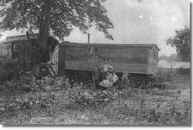 |
The roads were unadopted and were repaired by the 'new residents'. A working committee was formed to collect money (sixpence a week) for brick, rubble and ashes to be used for making a base for the roads. Subsequently ashes were purchased to fill in any potholes caused by wear and tear. The new residents were more than happy to bring shovels and spades to carry out repair work - no television to watch in those days. |
 |
My parents already had a general store on the Stratford Road - by the Crown Hotel - now Jefferson's. The store sold everything as well as the usual provisions and clothing. My father was shrewd and was soon selling everything needed by the new residents on the Mount to construct the chalets - timber, roofing, felt, gas-tar, nails, hinges, creosote - you name it my father sold it! The new residents borrowed - or should I say hired the wicker basket carriages to enable the 'settlers' to get their purchases to their plot. |
To make certain they were returned a deposit (refundable) was charged. Casual trade was a large part of the shop turnover. Walkers, cyclists, horse riders and children with their Saturday pennies. Meeting days at Shirley Racecourse were particularly busy, punters coming from all over the Birmingham area. Mugs of tea by the dozen sold well on race days and weekends. The belt drive 'Rudge Multi' motorcycle was well used to fetch the 1 cwt. Blocks of ice from Digbeth cold store (packed in salt petre to delay melting). |
During this time my father had a 200-gallon petrol tank put in the forecourt of the shop. It was branded R.O.P. (Russian Oil Products) and was dispensed by a hand-operated pump. The petrol was first pumped into glass half gallon bottles then hand lifted into the customer's petrol tank. The price was 10 pence a Gallon or 5½ d for half a gallon. I had three older brothers and as we became old enough we were designated tasks to assist in running the business. Turning the handle on the ice cream maker, carrying the 'pop' through from the store (2d bottles of R Whites minerals with a 1 d deposit on the bottle), washing mugs, filling shelves in the grocery shop and making up penny packets of biscuits etc. The cigarettes and tobacco glass fronted cabinet was never locked! The most popular brands were - five's of Woodbines, Park Drives and for the more affluent, Black cat, Gold Flake and Senior Service -(with real photos) and tins of tobacco - Oh and of course Twist.
A Midland Red bus service was extended from the George and Dragon and people from the Mount and Illshaw Heath cycled to our shop to catch the bus and we stored the cycles for sixpence a week. There were only two buses a day 08.15 and 17.45. We also serviced cycles and a charge was made for trimming the wicks and filling the lamps with paraffin. The motor cycles had carbide (not paraffin) lights and water dripping onto carbide granules made a gas that when burned was sufficient to be seen but useless to see by as the beam only radiated about two feet. While the shop was making a profit - as it always, did my parents purchased eight plots on the Mount Estate. |
At this time Robinson's Removals (furniture) were changing from horse drawn vans to motor vans. Dad bought six redundant vans and fitted coal-fired stoves - (Parkinson's cast iron) and put them on the plots of land he had purchased. The charge for renting the vans was three shillings a week. One van was kept as a sanctuary from the shop. I was born in that caravan (That's why there is a little gypsy in me!). |
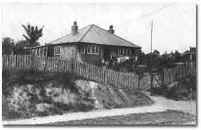 |
As time went on and the family got bigger the letting vans became our home up until our parents had a brick bungalow built, complete with dung-well-known as a dunwell which was emptied by Solihull Urban district council with the 'vinegar bottle', (no sewers in those days). |
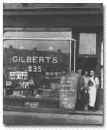 |
Our general stores were sold and a shoe repair shop was purchased at 835 Stratford Road, Sparkhill. My father was a bespoke shoemaker and ex-pupil of King Edward grammar school in New St, as my grandfather had insisted that his three sons must learn cobbling as well as learning academics. The town air in Sparkhill was said to be no good for me (my mother did not like living at the back of the shop and we moved back to the caravan on the Mount). |
The shoe repair shop was kept on to give my brothers a living. The land gave us ample room to play and separate sheds were built including a toy shed, china shed and a kitchen shed with VALOUR paraffin oil stoves and gravity fed rings and oven. (Nearly all the settlers had the above VALOUR oil stoves) Real mod cons!
The local Mount shops were Copes and Browns; they were wooden buildings and sold groceries and sweets. Copes shop also sold paraffin. Mrs. Brown's shop only sold sweets cigarettes and matches and was approached not only from the Mount but from watery lane as well. The Blacksmith George Bachelor's was next door to the wheelwrights (Bullivent and Bissell) at the corner of Watery lane and Salter Street. |
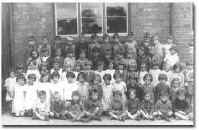 |
Salter Street Church and School was the focal point of the area, not only for the Mount residents but Hay Lane and Illshaw heath people also. - A long walk to school. There was always secret rivalry between the youths of Earlswood and Mount estate, football, cycling and the attention of the girls. |
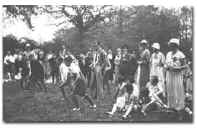 |
At the Earlswood fete teams opposed each other in challenges with the Daily Mail Pushball. The diameter of the ball was about six feet and the challenge continued until either side had no strength left to give it another shove. No time limit was set. George Cope from the Mount shop lost his spectacles and couldn't find the ball, even a ball with a diameter of six feet! |
George ended up pushing with the Earlswood team - without his spectacles he couldn't recognise any of his own team! He had to leave early anyway - to do the papers (Mail & Argus). |
The mount always had an entry in Shirley carnival. Woolaston Mill, (John Woolaston being the councilor representing the area), gave the transport. |
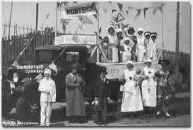 |

We knew one of the best as Jimmy Jesus who lived at the bottom of the Mount by Watery Lane and spread the Gospel in the Bull Ring in Birmingham. He had long hair down over his shoulders and was a good scrounger calling at local houses for his food. He went into my father's greenhouse and picked the first ripening tomato. Yes my father was quite annoyed. If there was no body about Jimmy would sneak into the fowl pen and help himself to one or two eggs.
Mr. Moore sold milk straight from the cow. He walked to Illshaw Heath to collect the milk with his yolk and two buckets, selling the milk as he returned home. Saturday nights most residents went to the Crown, Mild ale sixpence a pint and Atkinsons Brewery special Brown & Rough at five pence a pint. And for the ladies a shandy or a baby Guinness. Or a stick (measure) of beer or bitter. The live music was provided for dancing by three musicians from the mount.
Billy Groom pianist and singer, Bill Bayley on the banjo and Jack Derrick drums and percussion. The assembly room for the dancing got overcrowded and the overflow danced on the lawn. Charabanes (coaches) from Birmingham came on evening mystery tours (2/6d) all helped to swell the Saturday night crowds on the dance floor. Many people used the Plough Inn, quieter and more sedate than the Crown.
Walter Ward the Crown's owner made home made wine all sorts at 1/9d a bottle. On the counter in the 'smoke room' were always bits of cheese and occasionally finger-bites of pork pie. In the shop a corrugated iron roof shed attached to the Plough, Walter sold meats and cooked meets. In the cottages on the same grounds as the Plough lived Walters sister. Miss Ward turned her front room into a shop. My mother would send me to the Plough for a pint of M&B Nourishing Stout, 9d a bottle including a penny on the bottle.
Miss Stokes housekeeper and Bar person to Walter Ward could always find us a few salted peanuts or crisps if Walter was not looking. If I collected bottles of beer for my father it was law to fix a label over the cork. Before the sticky label had dried I would take it off and have a swig. Nobody noticed, as Miss Stokes would always give the beer measure 'a long pull'.
The plots of land on the Mount were quite long and a box or drainpipe was left for the milkman and postman to deposit their deliveries. The postman would come to a plot, blow his whistle and shout the name of the person who had a letter. Other residents would here and pass the information on. The Postman's voice was like a foghorn and could be heard down to the river and up to Tanworth lane. |
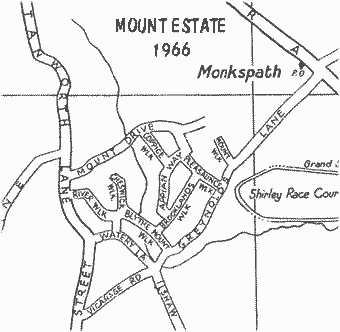
Road Map of the Mount Estate
|

During the war smoke screens were lit to help to black out Birmingham and the North Midlands. This depended on the way the wind was blowing. The oil containers were placed in lines about ten yards apart.
The smoke and fumes caused a lot of problems and the soot got everywhere. No matter how hard we tried the smoke and soot got into the house. Before we had cleaned up from one night's operation came the same thing the next night. Planes in distress came low over the Mount. |
On the corner of Kineton Lane and Stratford Road Reeves Farm was demolished. The land was then turned into a landing strip. Fortunately the area was never used for such an emergency and was used by the Home Guard for training purposes. |
Extracts From 'Life on the Mount' By Bill Gilbert |
| |  | |  |
To add a comment you must first login or join for free, up in the top left corner.
|
|


